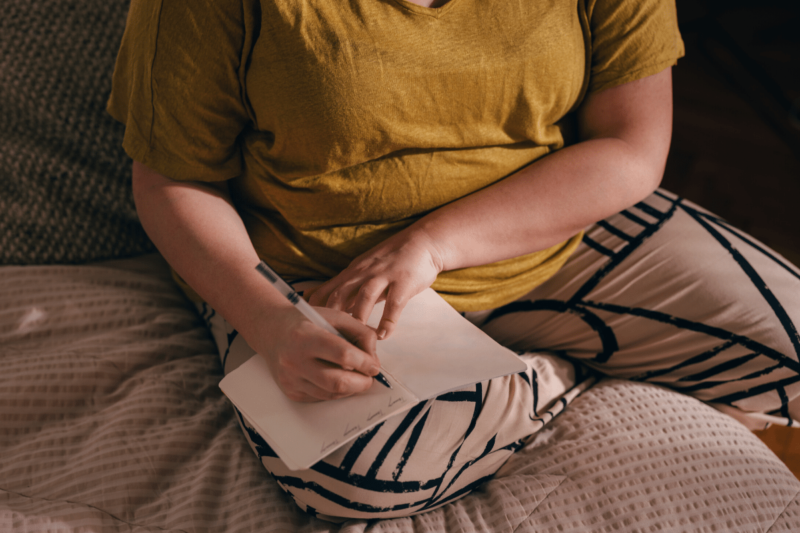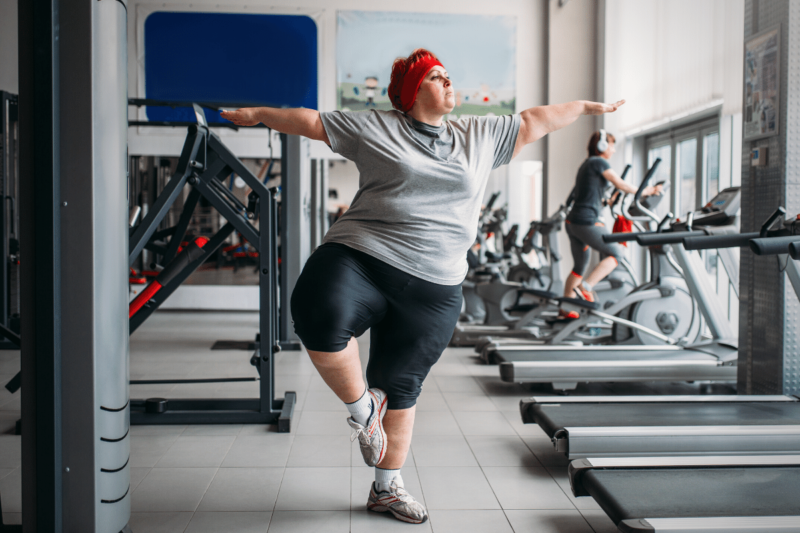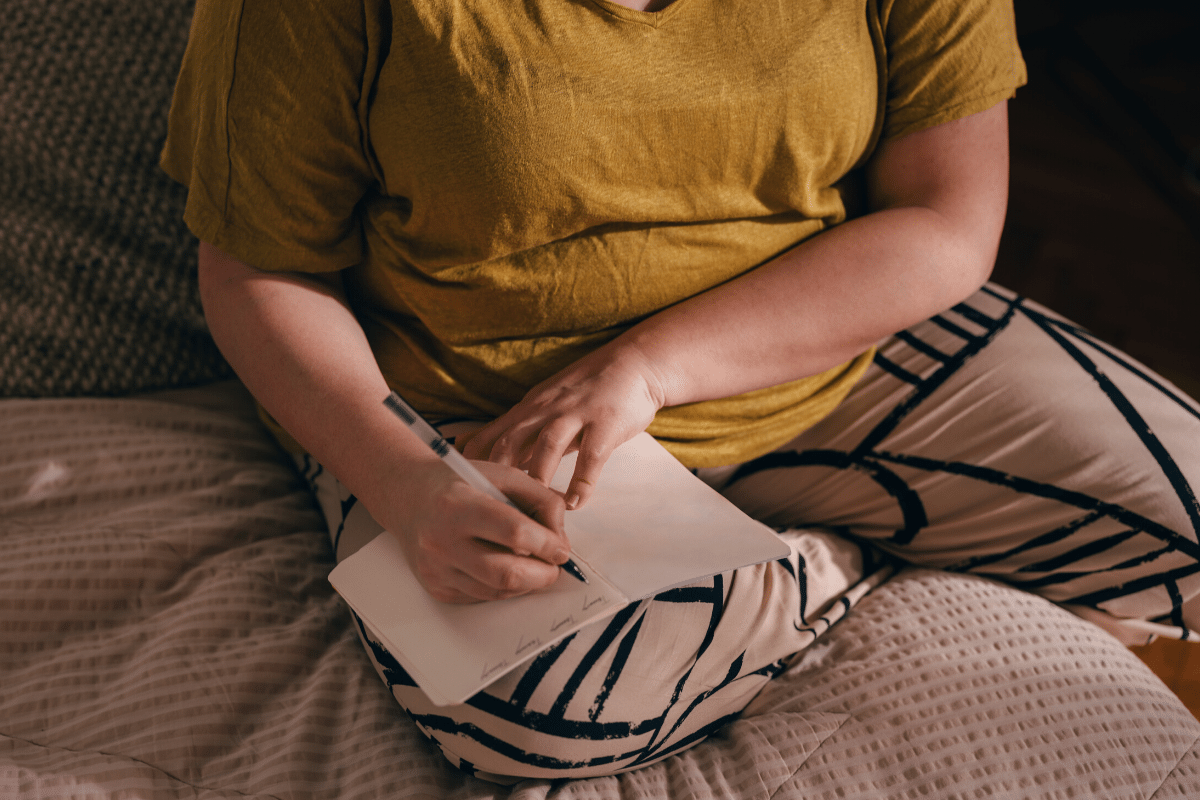Table of Contents

If you’re intrigued by intuitive eating, or at least heard of it (which if you’ve been following me for a bit, you have), you might wonder what you need to consider, or perhaps do, before giving it a go. Here are three factors that I think are important (so, more mind states than action items, although there are a few actionable things in the mix).
1. Realize that diets have not served you
It’s so, so, so, so common to think that each of the diets you’ve been on have worked (assume you lost weight on them), but that YOU failed by gaining the weight back.
The dirty little secret of the diet industry (and even academic weight loss research*) is that there are two phases of intentional weight loss — the weight loss phase and the weight regain phase. The overwhelming majority of people who alter their eating and/or exercise habits to create a calorie deficit and lose weight regain that weight within five years (or less) and sometimes end up at a higher weight than they started at.
*Most weight loss research doesn’t follow people long enough to fully capture the second phase. The follow-up period often ends around the point where participants have regained a little weight, but are far enough below their starting weight that the study is declared a “success.”
And before you think you’ll be one of those unicorns who loses weight and keeps it off long-term, consider these three things:
- It’s unclear why weight maintenance outliers (aka unicorns) are outliers.
- If you’ve already experienced weight loss and regain, then you’re not a unicorn (sorry).
- Some people who do maintain lost weight are white knuckling it, living a life of restriction and deprivation and possibly injuries from compulsive exercise (possibly to the degree of having an actual restrictive eating disorder). Is that the life you really want?
Not convinced? Take an inventory of EVERY SINGLE DIET you’ve been on (whether it was a “formal” diet program or a DIY effort) and answer these questions for each one:
- What was the diet?
- How long did you stay on the diet?
- Did you lose weight? How much?
- How long did you keep it off?
- How much weight did you regain?
Was dieting worth it?

2. Have an open mind
I’m not gonna lie: Intuitive eating can feel great, even revelatory, but it can also feel weird, at least at first.
The idea of allowing yourself to eat previously forbidden foods can feel exciting, scary, and liberating — not necessarily in that order, and often alternating between the three until you become more practiced.
The idea of allowing yourself to eat when you’re hungry without shaming yourself or feeling like you are virtuous and disciplined for skipping breakfast, not taking a lunch, avoiding snacking, or forcing yourself to wait a prescribed number of hours between meals can be like, “Whoa…what?”
Asking yourself what’s the kindest thing you can do for yourself when you are feeling emotions that are TOO MUCH, and accepting that sometimes the kindest thing is to use food to cope, can feel mind-blowing in a society that demonizes and pathologizes emotional eating. And brainstorming non-food ways to cope, then testing them out, might feel like walking a tightrope without a net. (But you do have a net, because if those new coping tools don’t work, food is still there.)
And, frankly, needing to actively build intuitive eating skills instead of — poof — suddenly, magically eating intuitively can feel like a surprise. But like learning (or relearning, in the case of intuitive eating) any skill, intuitive eating gets easier with practice.

3. Be ready to do some body image work
If you desire to be thinner, giving up dieting and/or compulsive exercising in favor of doing the deeper work of nurturing a healthier, more peaceful relationship with food and movement creates a vacuum.
If you don’t feel good about your body (or in your body) but are no longer trying to change your body, then it’s essential to fill the vacuum created by ceasing the pursuit of weight loss with the mental work of building positive body image. Otherwise, the pull to go on “one more diet” will be strong. So strong.
Before you think that means learning to love how you look, let me clarify. Positive body image isn’t some fluffy social media creation, it’s about appreciating and respecting your body for what it does for you. It’s also about a general appreciation — and possibly even love — for your body because it’s uniquely yours.
(Think of people in your life who you love, flaws and all. No person is “perfect,” and no body is “perfect,” because perfection is subjective and illusive and fleeting, if for no other reason.)
This version of positive body image is also often referred to as embodiment. It’s very different from what most people seek when they want to improve their body image. Putting all your better body image eggs in the liking your appearance basket places your body in the role of an object, and you in the role of objectifier. Embodiment treats your body as a subject, one that you can develop a better relationship with.
Another important part of body image work is challenging the idea that your worth lies in your body or your appearance. You are so much more than your body, and you have so much more to offer than your outsides.

Where to start
Of course, an intuitive eating journey logically starts with the “official” intuitive eating books (written by dietitians Evelyn Tribole and Elyse Resch, creators of the Intuitive Eating model. Certainly “Intuitive Eating: A Revolutionary Anti-Diet Approach,” “The Intuitive Eating Workbook: 10 Principles for Nourishing a Healthy Relationship with Food” (if you like workbooks), “The Intuitive Eating Journal: Your Guided Journey for Nourishing a Healthy Relationship with Food” (if you like journals), and
“Intuitive Eating for Every Day: 365 Daily Practices & Inspirations to Rediscover the Pleasures of Eating” (if you want bite-size morsels of wisdom and food for thought from the amazing, wise human that is Evelyn Tribole.
To that, I would add a solid body image book. There are many books I like and recommend, but “More Than A Body: Your Body Is an Instrument, Not an Ornament” is always a solid choice, because it looks at the systemic forces that feed body dissatisfaction, as well as offering practical tips for building positive body image.
Some people find that they can make the transition from dieter to intuitive eater with independent self-study, while others realize that they need some professional guidance. Everyone’s different, and sometimes the difference is…
- How long someone has been dieting
- How strong their feelings of body dissatisfaction are
- What kind of messages they received about food and body weight when they were young.
Don’t be afraid to ask for help if the DIY approach isn’t getting you to where you want to be.
Related posts (beyond the ones I already link to in this post):
This post contains Amazon Affiliate links. As an Amazon Associate I earn from qualifying purchases.
Carrie Dennett, MPH, RDN, is a Pacific Northwest-based registered dietitian nutritionist, freelance writer, intuitive eating counselor, author, and speaker. Her superpowers include busting nutrition myths and empowering women to feel better in their bodies and make food choices that support pleasure, nutrition and health. This post is for informational purposes only and does not constitute individualized nutrition or medical advice.
Seeking 1-on-1 nutrition counseling? Carrie offers a 6-month Food & Body program (intuitive eating, body image, mindfulness, self-compassion) and a 4-month IBS management program (low-FODMAP diet coaching with an emphasis on increasing food freedom). Visit the links to learn more and book a free intro call to see if the program is a good fit, and if we’re a good fit!
 Print This Post
Print This Post





More Stories
Avocado Cacao Mousse – JSHealth
Janelle Brown on Garrison’s Mental Health Before His Death
How To Finally Beat Insomnia